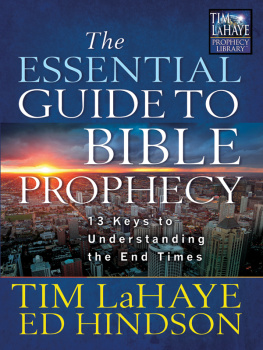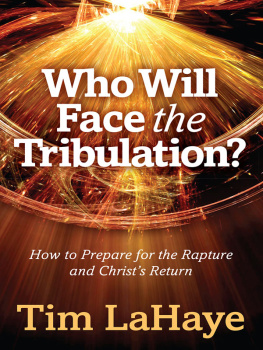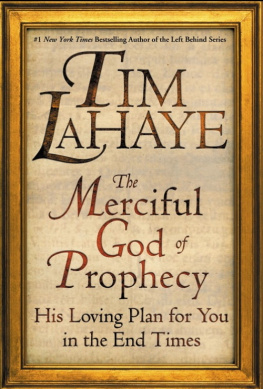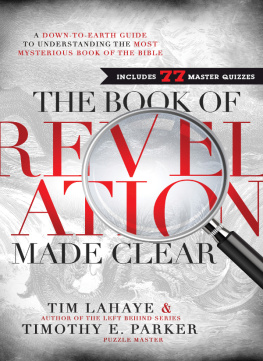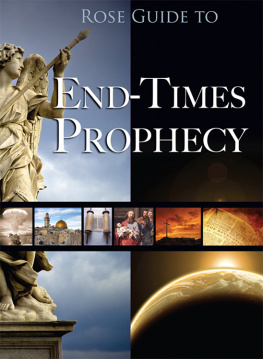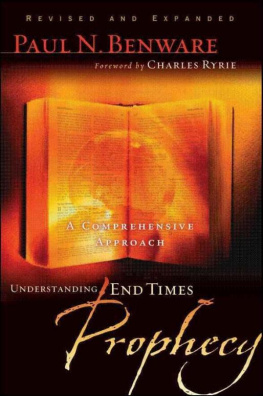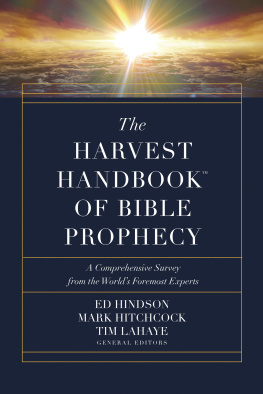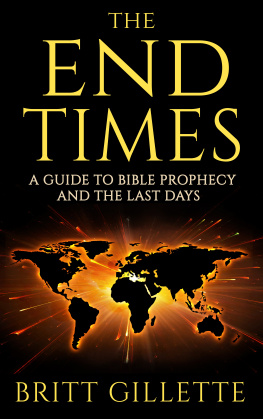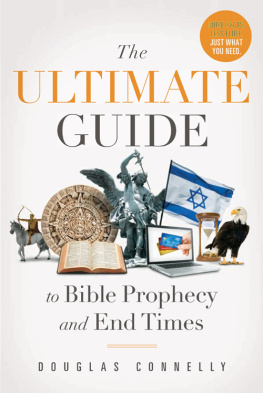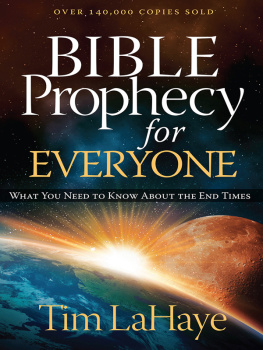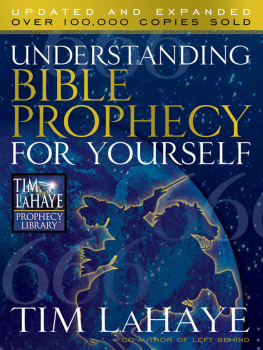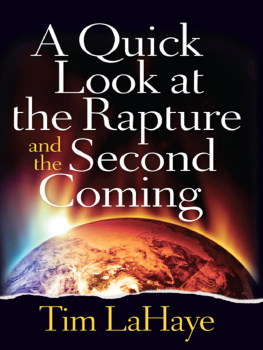

HARVEST HOUSE PUBLISHERS
EUGENE, OREGON
Unless otherwise indicated, all Scripture quotations are from the New King James Version. Copyright 1982 by Thomas Nelson, Inc. Used by permission. All rights reserved.
Verses marked NIV are from the Holy Bible, New International Version, NIV . Copyright 1973, 1978, 1984, 2011, by Biblica, Inc. Used by permission of Zondervan. All rights reserved worldwide. www.zondervan.com
Verses marked KJV are from the King James Version of the Bible.
Cover by Dugan Design Group, Bloomington, Minnesota
Cover photo Songquan Deng / Shutterstock
TIM LAHAYE PROPHECY LIBRARY is a series trademark of Tim F. LaHaye and Beverly J. LaHaye. Harvest House Publishers, Inc., is the exclusive licensee of the trademark TIM LAHAYE PROPHECY LIBRARY.
Some material has been adapted from The Popular Bible Prophecy Workbook .
THE ESSENTIAL GUIDE TO BIBLE PROPHECY
Copyright 2006/2012 by Pre-Trib Research Center, Tim LaHaye, and Ed Hindson
Published by Harvest House Publishers
Eugene, Oregon 97402
www.harvesthousepublishers.com
Library of Congress Cataloging-in-Publication Data
LaHaye, Tim F.
The essential guide to Bible prophecy / Tim LaHaye and Ed Hindson.
p. cm.
Includes bibliographical references.
ISBN 978-0-7369-3784-9 (pbk.)
ISBN 978-0-7369-4262-1 (eBook)
1. BibleProphecies. I. Hindson, Edward E. II. Title.
BS647.3.L33 2012
220.1'5dc23
2012019549
All rights reserved. No part of this publication may be reproduced, stored in a retrieval system, or transmitted in any form or by any meanselectronic, mechanical, digital, photocopy, recording, or any otherexcept for brief quotations in printed reviews, without the prior permission of the publisher.
C ONTENTS
E veryone is curious about the future. We all want to know what is going to happen next, but only God has the ability to see what is to come. Therefore, we must rely on His Word as our guide to understanding what lies ahead.
We are living in incredible times. Things are changing so fast we can hardly keep up with them. Before we can catch our breath, we are hurried on to the next significant event on the horizon. Tensions in the Middle East, the development of weapons of mass destruction, and threats to global peace fill the newspaper headlines. We all sense that the world is moving toward some great climax.
People today are asking, where are we headed? What will happen next? And how can we be prepared? These are the very questions Bible prophecy answers for us. Prophecy helps us to see into the future with clarity and confidence.
The purpose of Bible prophecy is not to frighten us, but to assure us that God is in control. In times of human uncertainty, we can rest assured that we have a sure word of prophecy (2 Peter 1:19 KJV ) that shines like a beacon of light into the darkness of our times. Therefore, we can lift our heads and know that our redemption is drawing near (Luke 21:28).
The purpose of this study is to help us examine what the Bible says about the future. We will look at key Bible prophecies about such matters as the rapture of the church and the rise of the Antichrist. We will explore major prophetic passages that describe the Tribulation, Christs glorious appearing, the millennial kingdom, and heaven.
The hope of the second coming of Christ is a strong encouragement for us to live right. The Bible reminds us, Abide in Him, that when He appears, we may have confidence and not be ashamed before Him at His comingWe know that when He is revealed, we shall be like Him, for we shall see Him as He is. And everyone who has this hope in Him purifies himself, just as He is pure (1 John 2:28; 3:2-3).
God bless you as you study these great prophetic truths. May they challenge your mind, move your heart, and lift your soul with great anticipation for the Saviors return.
Tim LaHaye
Ed Hindson
T he uniqueness of God is expressed in the predictive nature of Bible prophecy. There is nothing like this in any other religion. Only the God of the Bible can predict the future with perfect accuracy. For I am God, and there is no otherdeclaring the end from the beginning, and from ancient times things that are not yet done Indeed I have spoken it; I will also bring it to pass (Isaiah 46:9-11).
Jesus Christ also claimed divine authority for the prophetic Scriptures. The most dramatic prophecies in all the Bible point to the coming Messiah-Savior, who would both suffer and reign. These ancient prophecies were so precisely fulfilled that there can be no serious doubt that they point to only one person who has ever livedJesus of Nazareth.
After His resurrection, Jesus told His disciples, All things must be fulfilled which were written in the Law of Moses and the Prophets and the Psalms concerning Me (Luke 24:44). Christ Himself then taught the disciples which Old Testament scriptures predicted His life and ministry. He opened their understanding that they might comprehend the Scriptures (verse 45).
The New Testament writers were instructed by the Lord Himself regarding biblical prophecies and their fulfillment. The threefold designationLaw, Prophets, and Psalmsrefers to the three major divisions of the Hebrew Bible. Jesus was specifically stating that the entire Old Testament predicted the details of His life, ministry, death, and resurrection. Therefore, the preaching of the early Christian disciples was filled with references to Old Testament prophecies and their fulfillment in the person of Jesus Christ (see Acts 2:25-36; 3:22-23; 4:25-26; 13:46-49).
During His earthly ministry, Jesus was recognized as a prophet of God (Matthew 21:11; Luke 7:16) and a teacher from God (John 3:2). Jesus even referred to Himself as a prophet (Matthew 13:57; Luke 13:33). The early preaching of the apostles also emphasized the prophetic nature of Christs ministry (Acts 3:24-26; 7:37). Matthews Gospel alone makes 65 references to Old Testament scriptures, emphasizing their fulfillment in Christ.
The Prophet and the Prophetic Ministry
The prophetic histories are followed in the Hebrew canon by the prophetic books of prediction. The two form a unit in the middle portion of the threefold canon, under the common term Prophets. Jewish readers distinguish them as the former prophets and latter prophets. The manner of speaking by the prophets may be best characterized as preaching. Their messages also included symbolic actions (2 Kings 13:17-19), object lessons (Jeremiah 1:11-14), and written sermons (Jeremiah 36:4).
The Hebrew prophets were men of God who preached Gods Word and also predicted the future. Their messages revealed events that were yet to come. In this regard, their messages were supernatural, not natural. They were derived neither from observation nor intellectual thought, but from knowing God and speaking with Him.
What is a prophet? The first person in the Bible to be called a prophet was Abraham. This was a title given to him by God (Genesis 20:6-7). There were likely prophets who served before Abraham, such as Enoch (compare Genesis 5:24 with Jude 14), but it is significant that Abraham is the first prophet explicitly mentioned in Scripture. From his life, we can observe two key traits of the biblical prophets.
First, God chooses a prophet. Abrahams call makes this clear:
The L ORD had said to Abram, Go from your country, your people and your fathers household to the land I will show you.
Next page
